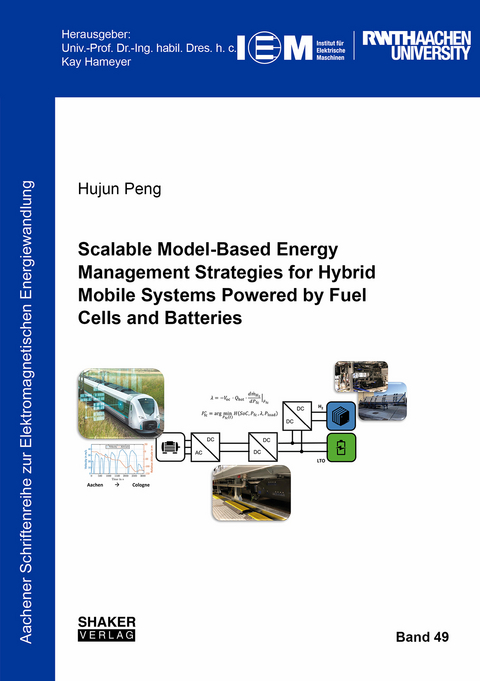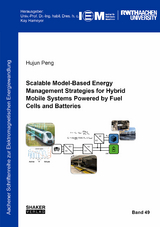Scalable Model-Based Energy Management Strategies for Hybrid Mobile Systems Powered by Fuel Cells and Batteries
Seiten
This dissertation developed energy management strategies for fuel-cell hybrid vehicles. It solves the most crucial point of determining the so-called equivalent factor faced by the Equivalent Consumption Minimization Strategy (ECMS), which was proposed after the world's first hybrid vehicle Toyota Prius came to mark the 90s of the 20th century. For this purpose, an analytical formula is derived for the first time to calculate the equivalent factor based on component characteristics curves and average load conditions. Due to the elegance of this formula, the developed energy management strategy is scalable, adaptive and efficient. Other significant results include developing offline optimal energy management as a reference to online strategies, including both offline PMP and dynamic programming. For the offline PMP strategy, the dynamic of the so-called co-state is considered without assuming zero, as found in other research works. Furthermore, the equivalent electrical circuit of the battery system in hybrid vehicles has a more accurate model than most published works by using more resistor-capacitor branches to model relaxation processes. Due to the accuracy of implemented offline strategies, online strategies can be reasonably evaluated. The last contribution of this work lies in the co-optimization of energy management and driving cycles for fuel-cell hybrid vehicles, which aims to maximize the energy efficiency of these vehicles.
Fuel cell trains have been brought to market by Alstom since 2018 to reduce carbon dioxide emission in order to electrify rail transportation without high investment in catenaries. Due to the fuel cell power dynamic constraints, a battery system is required to assist acceleration and recuperate energies during regenerative braking. Furthermore, because of the hybrid configuration of energy sources, the power distribution between fuel cells and batteries can be utilized to improve the performance of fuel cell trains. The kind of power distribution method is called energy management strategies. In designing energy management for fuel cell hybrid vehicles, the primary goal is to reduce hydrogen consumption. Besides that, a stable operation of fuel cell systems without much power dynamic change is also expected to prolong its lifetime. Therefore, this thesis will introduce scalable model-based energy management strategies to maintain high hydrogen efficiency under unpredictable driving conditions and the healthy operation of fuel cell systems.Energy management can be divided into offline and online strategies. The offline strategies, including dynamic programming and Pontryagin's minimum principle (PMP), are used as references to evaluate online strategies or help to improve online strategies. However, as the name refers, they can merely be applied offline because of their much higher computational load than online strategies. On the other hand, online strategies are implemented in real-time applications, including the rule-based method, the local optimization-based method, and the learning-based method. The rule-based strategy is based on the engineer's experience, which is not optimal due to the limited expertise. The learning-based strategy is received by training a neural network with enormous data from various driving scenarios, whose performance, however, in unfamiliar driving conditions is not persuading. Finally, the local optimization-based method lies in the focus of researchers due to its sub-optimality. The most famous local optimization-based methods are the Equivalent Consumption Minimization Strategy (ECMS) and the Adaptive Pontryagin's Minimum Principle (APMP). Both ECMS and APMP are essentially the same because the equivalent factor in ECMS can be derived from the costate defined in APMP. The most significant challenge faced with ECMS and APMP is to estimate the equivalent factor or the costate. However, all the methods found in the literature, including heuristic rules, PI-controllers, and driving pattern recognition, calculate the equivalent factor or the costate from the control aspect lacking physical explanation. Therefore, the local optimization-based method found in the literature does not have scalability, which cannot be transferred to other applications and driving conditions without difficulty.In this thesis, an analytical formula for estimating the costate for APMP will be developed for the first time based on the energy conversion principle. This formula merely uses the characteristic parameters of components, including the fuel cell system and the battery systems, to calculate the costate under different driving conditions. Furthermore, the convexity of the specific consumption curve of fuel cell systems is used in the formula, which helps enormously to improve hydrogen usage efficiency. Therefore, the developed APMP strategy can be applied for other applications and driving conditions without enormous tuning efforts because the formula for estimating the costate is model-based. In other words, the developed formula solves the most significant challenge faced with ECMS and APMP. The high fuel economy of the APMP strategy under various conditions is validated based on simulations and experimental measurements. As references, the offline PMP strategy is applied. It is worth mentioning that the implemented PMP strategy is more accurate than found in the literature because the third-order electrical
Fuel cell trains have been brought to market by Alstom since 2018 to reduce carbon dioxide emission in order to electrify rail transportation without high investment in catenaries. Due to the fuel cell power dynamic constraints, a battery system is required to assist acceleration and recuperate energies during regenerative braking. Furthermore, because of the hybrid configuration of energy sources, the power distribution between fuel cells and batteries can be utilized to improve the performance of fuel cell trains. The kind of power distribution method is called energy management strategies. In designing energy management for fuel cell hybrid vehicles, the primary goal is to reduce hydrogen consumption. Besides that, a stable operation of fuel cell systems without much power dynamic change is also expected to prolong its lifetime. Therefore, this thesis will introduce scalable model-based energy management strategies to maintain high hydrogen efficiency under unpredictable driving conditions and the healthy operation of fuel cell systems.Energy management can be divided into offline and online strategies. The offline strategies, including dynamic programming and Pontryagin's minimum principle (PMP), are used as references to evaluate online strategies or help to improve online strategies. However, as the name refers, they can merely be applied offline because of their much higher computational load than online strategies. On the other hand, online strategies are implemented in real-time applications, including the rule-based method, the local optimization-based method, and the learning-based method. The rule-based strategy is based on the engineer's experience, which is not optimal due to the limited expertise. The learning-based strategy is received by training a neural network with enormous data from various driving scenarios, whose performance, however, in unfamiliar driving conditions is not persuading. Finally, the local optimization-based method lies in the focus of researchers due to its sub-optimality. The most famous local optimization-based methods are the Equivalent Consumption Minimization Strategy (ECMS) and the Adaptive Pontryagin's Minimum Principle (APMP). Both ECMS and APMP are essentially the same because the equivalent factor in ECMS can be derived from the costate defined in APMP. The most significant challenge faced with ECMS and APMP is to estimate the equivalent factor or the costate. However, all the methods found in the literature, including heuristic rules, PI-controllers, and driving pattern recognition, calculate the equivalent factor or the costate from the control aspect lacking physical explanation. Therefore, the local optimization-based method found in the literature does not have scalability, which cannot be transferred to other applications and driving conditions without difficulty.In this thesis, an analytical formula for estimating the costate for APMP will be developed for the first time based on the energy conversion principle. This formula merely uses the characteristic parameters of components, including the fuel cell system and the battery systems, to calculate the costate under different driving conditions. Furthermore, the convexity of the specific consumption curve of fuel cell systems is used in the formula, which helps enormously to improve hydrogen usage efficiency. Therefore, the developed APMP strategy can be applied for other applications and driving conditions without enormous tuning efforts because the formula for estimating the costate is model-based. In other words, the developed formula solves the most significant challenge faced with ECMS and APMP. The high fuel economy of the APMP strategy under various conditions is validated based on simulations and experimental measurements. As references, the offline PMP strategy is applied. It is worth mentioning that the implemented PMP strategy is more accurate than found in the literature because the third-order electrical
| Erscheinungsdatum | 21.01.2023 |
|---|---|
| Reihe/Serie | Aachener Schriftenreihe zur Elektromagnetischen Energiewandlung ; 49 |
| Verlagsort | Düren |
| Sprache | englisch |
| Maße | 148 x 210 mm |
| Gewicht | 282 g |
| Themenwelt | Technik ► Elektrotechnik / Energietechnik |
| Schlagworte | APMP • Dynamic Programming • Energy Management • Fuel cell hybrid vehicles • PMP |
| ISBN-10 | 3-8440-8891-1 / 3844088911 |
| ISBN-13 | 978-3-8440-8891-5 / 9783844088915 |
| Zustand | Neuware |
| Haben Sie eine Frage zum Produkt? |
Mehr entdecken
aus dem Bereich
aus dem Bereich
Kolbenmaschinen - Strömungsmaschinen - Kraftwerke
Buch | Hardcover (2023)
Hanser (Verlag)
49,99 €




